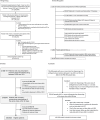Antihypertensive drug classes and risk of incident dementia: a multinational population-based cohort study
- PMID: 40413804
- PMCID: PMC12103899
- DOI: 10.1093/ageing/afaf121
Antihypertensive drug classes and risk of incident dementia: a multinational population-based cohort study
Abstract
Background: Angiotensin-converting enzyme inhibitors (ACEIs) and angiotensin-II receptor blockers (ARBs) are first-line antihypertensive drugs for many patients, and influencing angiotensin systems may play a role in dementia risk. This study aimed to investigate whether exposure to different antihypertensive drug classes compared with ACEI affects the risk of dementia and pathological dementia subtypes in a large multinational database study.
Methods: This was a multinational population-based cohort study using electronic health databases in Hong Kong, the UK, Sweden and Australia. A common protocol was used to harmonise the study design. An active comparator, a new user design, was applied to compare the risk of all-cause dementia between different antihypertensive drug classes, with secondary outcomes of Alzheimer's disease (AD) and vascular dementia (VaD). Adjusted Cox proportional hazards models with inverse probability of treatment weighting were used to generate results in each study site and were pooled in meta-analysis.
Results: One million nine hundred twenty-five thousand, five hundred sixty-three individuals were included across the four databases with a median follow-up ranging from 5.6 to 8.4 years. Compared to ACEI, initiation with ARB was associated with a reduced risk of incident all-cause dementia [hazard ratio (HR): 0.92, 95% confidence interval (CI): 0.89-0.94] and VaD (HR 0.87, 95% CI 0.78-0.96) but not AD.
Conclusions: This is the largest multinational cohort study conducted to date investigating different classes of antihypertensive drugs and the risk of incident dementia. When initiating antihypertensives, physicians and patients should consider the reduced risk of all-cause dementia and VaD with ARB compared with ACEI in their risk-benefit assessment.
Keywords: antihypertensive drugs; dementia; multinational cohort study; older people.
© The Author(s) 2025. Published by Oxford University Press on behalf of the British Geriatrics Society.
Conflict of interest statement
K.K.L. received grants from the Research Fund Secretariat of the Food and Health Bureau, Innovation and Technology Bureau, Research Grants Council, Amgen, Boehringer Ingelheim, Eisai and Pfizer; and consultation fees from Amgen, Boehringer Ingelheim, Daiichi Sankyo and Sanofi, all outside the submitted work. E..Y.F.W. has received research grants from the Health Bureau, the Hong Kong Research Grants Council, Narcotics Division, Security Bureau, Social Welfare Department, Labour and Welfare Bureau of the Government of the Hong Kong SAR and National Natural Science Foundation of China; serves on member of Core Team for Expert Group on Drug Registration of Pharmacy and Poisons Board, and is the director of Advance Data Analytics for Medical Science (ADAMS) Limited (HK). These are outside the submitted work. E.W.C. reports grants from Research Grants Council (RGC, Hong Kong), Research Fund Secretariat of the Food and Health Bureau, National Natural Science Fund of China, Wellcome Trust, Bayer, Bristol-Myers Squibb, Pfizer, Janssen, Amgen, Takeda, Narcotics Division of the Security Bureau of HKSAR and honorarium from Hospital Authority, outside the submitted work. I.C.K.W. reports research funding from Amgen, Bristol Myers Squibb, Pfizer, Janssen, Bayer, GSK, Novartis, the Hong Kong Research Grants Council, the Hong Kong Health and Medical Research Fund, the National Institute for Health Research in England, the European Commission and the National Health and Medical Research Council in Australia, outside the submitted work and is a nonexecutive director of Jacobson Medical in Hong Kong and a consultant to IQVIA and World Health Organization and serves as a member of the Pharmacy and Poisons Board, Hong Kong SAR, Expert Committee on Clinical Events Assessment Following COVID-19 Immunization and Advisory Panel on COVID-19 Vaccines of the Hong Kong Government. C.S.L.C. has received grants from the Food and Health Bureau of the Hong Kong Government, Hong Kong Research Grant Council, Hong Kong Innovation and Technology Commission, Pfizer, IQVIA and Amgen and personal fees from Primevigilance Ltd., outside the submitted work.
Figures


References
-
- World Health Organization . Dementia Key Facts 2020, Geneva, WHO, [Available from: https://www.who.int/news-room/fact-sheets/detail/dementia]. Accessed on 16 October 2023.
Publication types
MeSH terms
Substances
LinkOut - more resources
Full Text Sources
Medical

